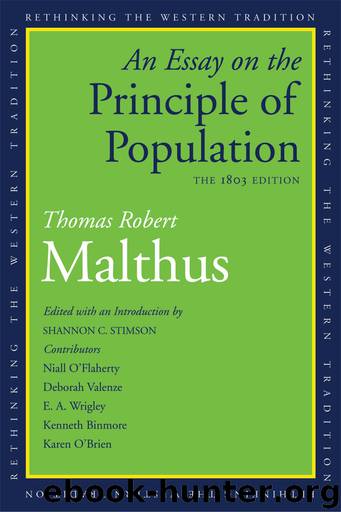An Essay on the Principle of Population by Thomas Robert Malthus

Author:Thomas Robert Malthus [Malthus, Thomas Robert]
Language: eng
Format: epub
Publisher: Yale University Press
Published: 2017-03-12T05:00:00+00:00
CHAP. II.
Of Systems of Equality. Godwin.
IN reading Mr. Godwin’s ingenious work on political justice, it is impossible not to be struck with the spirit and energy of his style, the force and precision of some of his reasonings, the ardent tone of his thoughts, and particularly with that impressive earnestness of manner, which gives an air of truth to the whole. At the same time it must be confessed, that he has not proceeded in his inquiries with the caution that sound philosophy requires. His conclusions are often unwarranted by his premises. He fails sometimes in removing objections which he himself brings forward. He relies too much on general and abstract propositions which will not admit of application. And his conjectures certainly far outstrip the modesty of nature.
The system of equality which Mr. Godwin proposes, is, on a first view, the most beautiful and engaging of any that has yet appeared. An amelioration of society to be produced merely by reason and conviction, gives more promise of permanence, than any change effected, and maintained by force. The unlimited exercise of private judgement, is a doctrine grand and captivating, and has a vast superiority over those systems, where every individual is in a manner the slave of the publick. The substitution of benevolence, as the masterspring and moving principle of society, instead of self-love, appears, at first sight, to be a consummation devoutly to be wished. In short, it is impossible to contemplate the whole of this fair picture without emotions of delight and admiration, accompanied with an ardent longing for the period of its accomplishment. But alas! that moment can never arrive. The whole is little better than a dream – a phantom of the imagination. These “gorgeous palaces” of happiness and immortality, these “solemn temples” of truth and virtue, will dissolve, “like the baseless fabric of a vision,” when we awaken to real life, and contemplate the genuine situation of man on earth.
Mr. Godwin, at the conclusion of the third chapter of his eighth book, speaking of population, says, “There is a principle in human society, by which population is perpetually kept down to the level of the means of subsistence. Thus, among the wandering tribes of America and Asia, we never find, through the lapse of ages, that population has so increased as to render necessary the cultivation of the earth.”1 This principle, which Mr. Godwin thus mentions as some mysterious and occult cause, and which he does not attempt to investigate, has appeared to be the grinding law of necessity – misery, and the fear of misery.
The great error under which Mr. Godwin labours, throughout his whole work, is, the attributing of almost all the vices and misery that prevail in civil society to human institutions. Political regulations, and the established administration of property, are, with him, the fruitful sources of all evil, the hotbeds of all the crimes that degrade mankind. Were this really a true state of the case, it would not seem an absolutely
Download
This site does not store any files on its server. We only index and link to content provided by other sites. Please contact the content providers to delete copyright contents if any and email us, we'll remove relevant links or contents immediately.
| Anthropology | Archaeology |
| Philosophy | Politics & Government |
| Social Sciences | Sociology |
| Women's Studies |
Cecilia; Or, Memoirs of an Heiress — Volume 1 by Fanny Burney(32558)
The Great Music City by Andrea Baker(32018)
Cecilia; Or, Memoirs of an Heiress — Volume 2 by Fanny Burney(31956)
Cecilia; Or, Memoirs of an Heiress — Volume 3 by Fanny Burney(31940)
We're Going to Need More Wine by Gabrielle Union(19045)
All the Missing Girls by Megan Miranda(16023)
Pimp by Iceberg Slim(14506)
For the Love of Europe by Rick Steves(14121)
Bombshells: Glamour Girls of a Lifetime by Sullivan Steve(14073)
Talking to Strangers by Malcolm Gladwell(13370)
Norse Mythology by Gaiman Neil(13363)
Fifty Shades Freed by E L James(13239)
Mindhunter: Inside the FBI's Elite Serial Crime Unit by John E. Douglas & Mark Olshaker(9339)
Crazy Rich Asians by Kevin Kwan(9290)
The Lost Art of Listening by Michael P. Nichols(7506)
Enlightenment Now: The Case for Reason, Science, Humanism, and Progress by Steven Pinker(7311)
The Four Agreements by Don Miguel Ruiz(6763)
Bad Blood by John Carreyrou(6621)
Weapons of Math Destruction by Cathy O'Neil(6279)
